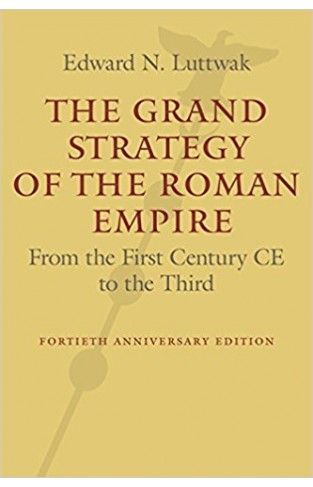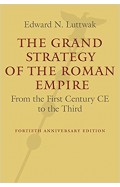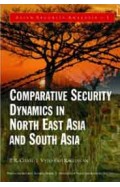The Grand Strategy of the Roman Empire: From the First Century CE to the Third
By: Edward N. Luttwak
-
Rs 4,568.75
- Rs 5,375.00
- 15%
You save Rs 806.25.
Due to constant currency fluctuation, prices are subject to change with or without notice.
At the height of its power, the Roman Empire encompassed the entire Mediterranean basin, extending much beyond it from Britain to Mesopotamia, from the Rhine to the Black Sea. Rome prospered for centuries while successfully resisting attack, fending off everything from overnight robbery raids to full-scale invasion attempts by entire nations on the move. How were troops able to defend the Empire’s vast territories from constant attacks? And how did they do so at such moderate cost that their treasury could pay for an immensity of highways, aqueducts, amphitheaters, city baths, and magnificent temples?
In The Grand Strategy of the Roman Empire, seasoned defense analyst Edward N. Luttwak reveals how the Romans were able to combine military strength, diplomacy, and fortifications to effectively respond to changing threats. Rome’s secret was not ceaseless fighting, but comprehensive strategies that unified force, diplomacy, and an immense infrastructure of roads, forts, walls, and barriers. Initially relying on client states to buffer attacks, Rome moved to a permanent frontier defense around 117 CE. Finally, as barbarians began to penetrate the empire, Rome filed large armies in a strategy of "defense-in-depth," allowing invaders to pierce Rome’s borders.
This updated edition has been extensively revised to incorporate recent scholarship and archeological findings. A new preface explores Roman imperial statecraft. This illuminating book remains essential to both ancient historians and students of modern strategy.
At the height of its power, the Roman Empire encompassed the entire Mediterranean basin, extending much beyond it from Britain to Mesopotamia, from the Rhine to the Black Sea. Rome prospered for centuries while successfully resisting attack, fending off everything from overnight robbery raids to full-scale invasion attempts by entire nations on the move. How were troops able to defend the Empire’s vast territories from constant attacks? And how did they do so at such moderate cost that their treasury could pay for an immensity of highways, aqueducts, amphitheaters, city baths, and magnificent temples?
In The Grand Strategy of the Roman Empire, seasoned defense analyst Edward N. Luttwak reveals how the Romans were able to combine military strength, diplomacy, and fortifications to effectively respond to changing threats. Rome’s secret was not ceaseless fighting, but comprehensive strategies that unified force, diplomacy, and an immense infrastructure of roads, forts, walls, and barriers. Initially relying on client states to buffer attacks, Rome moved to a permanent frontier defense around 117 CE. Finally, as barbarians began to penetrate the empire, Rome filed large armies in a strategy of "defense-in-depth," allowing invaders to pierce Rome’s borders.
This updated edition has been extensively revised to incorporate recent scholarship and archeological findings. A new preface explores Roman imperial statecraft. This illuminating book remains essential to both ancient historians and students of modern strategy.
The Grand Strategy of the Roman Empire: From the First Century CE to the Third
By: Edward N. Luttwak
Rs 4,568.75 Rs 5,375.00 Ex Tax :Rs 4,568.75
The Art of Military Innovation - Lessons from the Israel Defense Forces
By: Edward N. Luttwak
Rs 11,245.50 Rs 12,495.00 Ex Tax :Rs 11,245.50
Zubin Mehta: A Musical Journey (An Authorized Biography)
By: VOID - Bakhtiar K. Dadabhoy
Rs 892.50 Rs 1,050.00 Ex Tax :Rs 892.50
Built to Last Successful Habits Of Visionary CompaniesAI
By: James C. Collins
Rs 4,045.50 Rs 4,495.00 Ex Tax :Rs 4,045.50
Anna Hazare: The Face Of Indias Fight Against Corruption
By: Pradeep Thakur
Rs 255.00 Rs 300.00 Ex Tax :Rs 255.00
Idea Man: A Memoir by the Cofounder of Microsoft
By: Paul Allen
Rs 1,547.50 Rs 3,095.00 Ex Tax :Rs 1,547.50
How The End Begins: The Road to a Nuclear World War III
By: Ron Rosenbaum
Rs 1,097.50 Rs 2,195.00 Ex Tax :Rs 1,097.50
Comparative Security Dynamics in North East Asia and South Asia English Spanish French Italian German Japanese Chinese Hindi and Korean Edition
By: N/A
Rs 1,062.50 Rs 1,250.00 Ex Tax :Rs 1,062.50
The Nexus: International Terrorism and Drug Trafficking from Afganistan
By: N/A
Rs 1,780.75 Rs 2,095.00 Ex Tax :Rs 1,780.75
Trading Secrets: Spies and Intelligence in an Age of Terror
By: Mark Huband
Rs 2,422.50 Rs 2,850.00 Ex Tax :Rs 2,422.50
Hunting Che: How A US Special Forces Team Helped Capture the Worlds Most Famous Revolutionary
By: Mitch Weiss
Rs 1,747.50 Rs 3,495.00 Ex Tax :Rs 1,747.50
Soldier Sahibs The Men Who Made the NorthWest Frontier
By: Charles Allen
Rs 1,816.75 Rs 2,795.00 Ex Tax :Rs 1,816.75
Civilian Warriors The Inside Story of Blackwater and the Unsung Heroes of the War on Terror
By: Erik Prince
Rs 1,525.75 Rs 1,795.00 Ex Tax :Rs 1,525.75
Built to Last Successful Habits Of Visionary CompaniesAI
By: James C. Collins
Rs 4,045.50 Rs 4,495.00 Ex Tax :Rs 4,045.50
Anna Hazare: The Face Of Indias Fight Against Corruption
By: Pradeep Thakur
Rs 255.00 Rs 300.00 Ex Tax :Rs 255.00
Idea Man: A Memoir by the Cofounder of Microsoft
By: Paul Allen
Rs 1,547.50 Rs 3,095.00 Ex Tax :Rs 1,547.50
No recently viewed books available at the moment.
Zubin Mehta: A Musical Journey (An Authorized Biography)
By: VOID - Bakhtiar K. Dadabhoy
Rs 892.50 Rs 1,050.00 Ex Tax :Rs 892.50
The Grand Strategy of the Roman Empire: From the First Century CE to the Third
By: Edward N. Luttwak
Rs 4,568.75 Rs 5,375.00 Ex Tax :Rs 4,568.75
The Art of Military Innovation - Lessons from the Israel Defense Forces
By: Edward N. Luttwak
Rs 11,245.50 Rs 12,495.00 Ex Tax :Rs 11,245.50
Built to Last Successful Habits Of Visionary CompaniesAI
By: James C. Collins
Rs 4,045.50 Rs 4,495.00 Ex Tax :Rs 4,045.50
Anna Hazare: The Face Of Indias Fight Against Corruption
By: Pradeep Thakur
Rs 255.00 Rs 300.00 Ex Tax :Rs 255.00
Idea Man: A Memoir by the Cofounder of Microsoft
By: Paul Allen
Rs 1,547.50 Rs 3,095.00 Ex Tax :Rs 1,547.50















-120x187.jpg?q6)

















